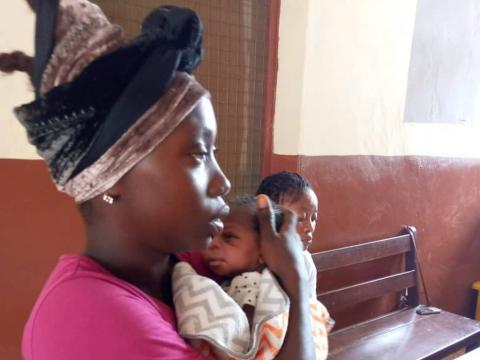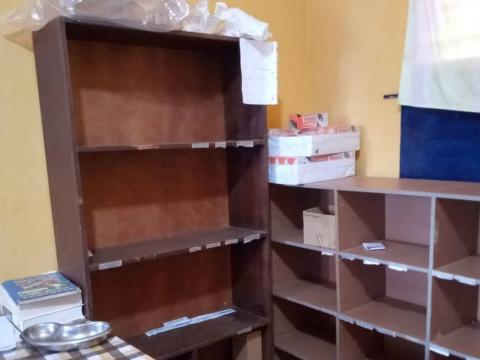By Makalay Saidiatu Sonda
“This is a failed resuscitation attempt tonight to save a new-born whose mother had had an obstructed labour at the Mosongo Health Care Centre in Njala for over two hours. We did not have the paediatric resuscitation tools, not even oxygen for a successful resuscitation. The mother survived… It was a joint effort of staff at the health centre and Njala University Hospital…”
Sounds familiar? Well, the above was a note from a medical officer who was part of a team that fought to rescue a new-born baby. The note was attached to a video I saw of the incident which happened around 11:00PM on Tuesday. It left me in tears both as a woman and a Sierra Leonean. But also as a human being!
The new-born baby was struggling to stay in its new world. Her mum had come to Njala from a nearby village in the hope she could get a safe delivery. Doctors and nurses were in the thick of it all. They were making do with the basic equipment they had, pumping air into the baby as they tried their best to save the poor child.
There was no electricity in the room and some of the most basic lifesaving equipment was not available either. Sadly but unsurprisingly the baby died. Hours after it had arrived in one of the worst countries in the world to be born. So this, sad as it may be, was just one of the everyday stories in our clinics and hospitals.
Sierra Leone has for ages been battling maternal and infant mortality and morbidity. The country is one of the worst places in the world to give birth and to be born – with some of the highest maternal and child mortality rates anywhere on earth.
According to the United Nations, six percent of women who go to give birth in Sierra Leone die from reproductive health complications. Also an estimated 114 per 1,000 new-borns die before their fifth birthday.
However, seeing that video left me scared and worried for the lives of not just pregnant women and babies but also for us all living in this community called Njala: my eight-year-old daughter, my husband, myself, my friends, my neighbours, my workmates and the thousands of students who reside on campus when school is in progress.
As a development and social worker, this prompted me to do a visit to the Njala University Hospital, and I couldn’t just believe how ill-equipped and dilapidated it has become due to long years of neglect.
Njala University Hospital is a referral hospital – or supposed to be – built in 1964 to cater for students and staff of the University and the surrounding communities of Kori Chiefdom in Moyamba District. The University was to serve as a teaching, referral and research hospital. However, its mission has not been accomplished nor has its mandate been met in the past decades. The hospital lacks the requisite facilities to cater adequately for the people it was set up to serve.
I did a tour of the hospital and it is an understatement to say there are challenges. There is a plethora of problems, and as a result lives are being lost often needlessly.
The Covid-19 pandemic has worsened an already deplorable situation. Whilst government and other development stakeholders focus on the fight against the pandemic, other challenges affecting our health sector and the wellbeing of our population are being overlooked. I strongly believe that if deaths as a result of these challenges were counted, they would far surpass those caused by the coronavirus.
During my tour of the hospital, I saw that there was a theatre but it’s not functioning. No surgery is done there. According to the Surgical Officer of the hospital, Ibrahim Fortune, the theatre is non-functional because crucial and basic equipment for operation is not available. This includes universal anaesthesia machine, oxygen concentration machine, suction machine, laparotomy set, caesarean section set, hernioraphy set etc. The lack of the vital items renders the theatre useless.
But the theatre is not the only problem. There is a myriad of issues begging for attention. The labour room does not have resuscitation equipment for mother and baby, no oxygen machine, no appropriate materials for Caesarean section. One of the nurses working at the labour room told me that even essential lifesaving drugs such as Oxytocin, Ampicillin, Dexamethasone, Magnesium sulphate, Phenobarbitone to name but a few, are no available. I could see for myself that there was no running water. No running water in the whole hospital! I asked about that, and I was told the tap only runs once every quarter (three to even four months). Shocking!
As I stood there perplexed, a woman came with her child – just three days old. The baby was convulsing. The nurses rushed to check the baby and see what they could do. They used their expertise to help. The mother stood there, and you could see on her face the state of torment and confusion she was in. Unsure what would happen to her child. “Dis na me fos born”, she said in Krio. Meaning the baby is her firstborn.
“You see,” the Community Health Officer, Sahr Foday turned to me saying resignedly: “now we need an anti-convulsant injection to give to this baby, but the injection is not available”. My heart pounded, as fast as my hope shattered, for the poor baby. Sad and worried, I prayed in my heart that nothing should happen to the innocent boy. The nurses did their best. Even without having what they needed, they tried their best. I returned home with my eyes pregnant. I returned to the hospital in the afternoon to see how the baby was fairing. Thankfully he lay on the hospital bed sleeping, as his innocence glowed – with his mom sitting beside him.
“E don cam to now” – he is stable now– the nurse told me. “Do you want to marry him? He’s a cute boy” she asked me jokingly. “Yes!” I exclaimed, beaming with smile stretching jaw to jaw. The smile on the mother’s face was priceless and infectious. Seeing her son out of danger brought sunshine to her hitherto dark mood. It was a sigh of relief for us all. After the needless death of that baby, we didn’t want a similar story of an innocent child snatched so brutally.
Amidst Covid-19 in Sierra Leone, we must not forget the other problems our health sector faces. Lives are lost because of the lack of lifesaving drugs or equipment in our hospitals. Training staff to refresh their knowledge or learn new techniques to help make them more efficient and effective is almost non-existent in health facilities in most of rural Sierra Leone. Preventable deaths are what send people including women and children to their early grave. We must not ignore other critical health issues and challenges we have in the health sector just because there is COVID-19, however important that fight is. Whilst we fight the coronavirus we must not forget or ignore the other everyday fights.
Copyright © 2020 Politico Online









